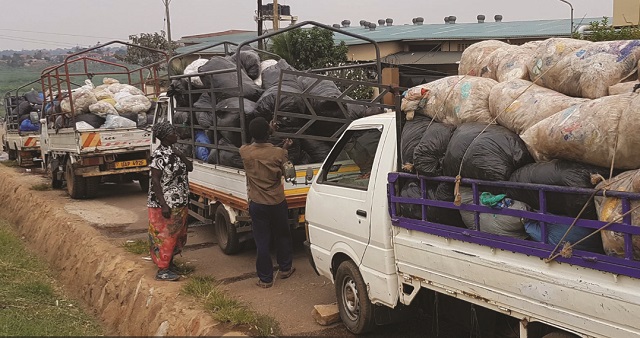
Kampala, Uganda | THE INDEPENDENT | Plastic collectors from different parts of the country on Thursday protested the 40 percent increment of tax imposed on imported polymer bags like polythene and sacks.
Last month, Parliament adopted a proposal by President Yoweri Museveni to increase excise duty on polymer bags and sacks from sh270 to sh4000 a kilogram. The Parliamentary Finance Committee had raised an objection to the proposal, saying that the tax was too high.
The collectors say that since the tax was increased, recycling factories have refused to buy polythene bags because fresh plastic, polymer plastics which they have to mix with the recycled plastics are now taxed highly and hence expensive.
The plastic scrap buyers collect and sell polythene commonly known as Kaveera to recycling companies that in the end manufacture products like garbage bags, plastic bins, tanks, and sandals.
At a protest staged at one of the collection centers in Namavundu in Kasangati town council, Yahaya Umaru, one of the plastics collectors says the government should revisit its decision on the tax because it’s already affecting their source of income.
He says that previously he would sell over 12 tons per trip selling over 40 tons a month. But now, he is stuck with over 30 tons of plastic which he had prepared to sell to factories but has declined to buy it. Umaru explains that there are over 200 dealers who are currently in his situation.
Judith Ssekajja, also a plastics collector says she has been employing 30 people to collect the plastic and it is now close to a month since recycling factories declined to buy from her, and is stuck with over 35 tons of plastics.
According to Ssekajja, a ton of plastic scrap is sold at 400,000 Shillings but she cannot make this money unless the tax on plastics is lifted or reduced such that factories resume buying from them.
Another collector and supplier, Jalia Nakayiza says there are over 800 people employed in the plastic collection and trading industry who will likely become unemployed once the situation gets out of hand and factory owners still decline to buy plastics for recycling.
Eng. Alfred Kasereka from Pipeline Design and Foam Industries says they cannot break even with the new taxes, which explains why they have suspended buying the plastics. He says that for them to produce products from recycled plastics, they need to mix the recycled materials with the new material, virgin material.
“If we rely on only recycled materials, we shall not even better the quality of the products we are running in Uganda. You’ll find that you use 65 percent recycled and 15 percent virgin. That’s why companies are struggling” said Kasereka.
He says that they had over 100 suppliers and crashes over 30 tons of plastics per day which they can no longer do. He added that for both their factories in Luzira and Kabanyoro along Zirobwe road they employ over 740 workers whose jobs are now at risk in case the industries close due to the high tax on materials they use.
Kasereka says that government should hold talks with people in the recycling industry to reach an amicable solution that protects the environment but also keeps the industry working. He says there is already a lot of plastics in communities that needs to be recycled but this has been made difficult with the increase in tax. There are over 40 recycling companies in Uganda.
In July last year, the cabinet resolved to impose a total ban on all polythene bags as part of the effort to restore the environment in what has been dubbed as the restoration decade. The decision that was to take immediate effect would affect manufacturing, importation, sell, use, distribution, or otherwise dealing in polythene bags.
The National Environment Management Authority-NEMA however noted that a total ban could not be effected since the National Environment Act (2019) gives an exception for plastic carrier bags or plastic products made of polythene and propylene of above thirty microns.
In his proposal which was passed by Parliament, Museveni increased the tax making an exception on packaging bags for food, juices, tea, and coffee and bags for direct use in the manufacture of sanitary pads.
*****
URN
 The Independent Uganda: You get the Truth we Pay the Price
The Independent Uganda: You get the Truth we Pay the Price



